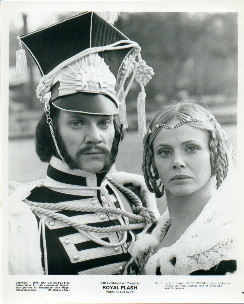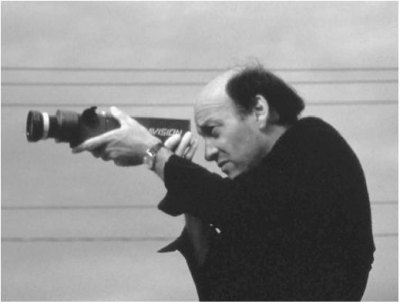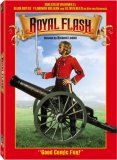| Reviews & Columns |
|
Reviews DVD TV on DVD Blu-ray 4K UHD International DVDs In Theaters Reviews by Studio Video Games Features Collector Series DVDs Easter Egg Database Interviews DVD Talk Radio Feature Articles Columns Anime Talk DVD Savant Horror DVDs The M.O.D. Squad Art House HD Talk Silent DVD
|
DVD Talk Forum |
|
|
| Resources |
|
DVD Price Search Customer Service #'s RCE Info Links |
|
Columns
|
|
|
Royal Flash
Actor-producer Stanley Baker bought the rights to Flashman, the first Fraser novel, for director Mike Hodges, and even wanted Malcolm McDowell, Royal Flash's leading man, to play the part, but the film was never made. In adapting the second book, Fraser cribs the opening scenes from the first novel, dramatizing how Captain Harry Flashman (who first appeared in literary form as the bully of Tom Brown's School Days) unjustly becomes a celebrity-hero (the "Hector of Afghanistan") during the First Anglo-Afghan War. Though apparently the sole survivor of a losing battle, the British flag wrapped around his bosom, in fact Flashman was desperately trying to surrender: "Here, take the bloody thing!" he says, "I don't want it!"
The bulk of the picture, set in the 1840s, concerns Flashman's relationships with the insatiable courtesan Lola Montez (Florinda Bolkan) and Otto von Bismark (Oliver Reed), and how Flashman becomes embroiled in an elaborate plot of the latter in which Flashman impersonates a Bavarian prince (also McDowell) to unify Germany.
The film is Lester's most broadly humorous since A Funny Thing Happened on the Way to the Forum (1966), though like his Musketeers films, the sight gags are broadly elaborate yet funny because the cutting and direction under-emphasizes them, treating most gags as throwaways. Also as per Lester's style, a good chunk of the humor is derived from the film's eccentric characterizations, most obvious here in the form of steel-handed bald henchman Kraftstein, played without dialog by Lionel Jeffries.
McDowell, in a role not unlike his Alex in A Clockwork Orange, is a devious, cocky and cowardly little S.O.B., a rogue with absolutely no sense of morality. It took a while for the actor to shake this sort of typecasting (1979's Time After Time took him 180-degrees from this part, however), but he's perfectly cast here, and part of the appeal for McDowell is how committed he is making his characters so thoroughly, deliciously reprehensible. Predictably, Oliver Reed is imposing as von Bismark but he does a fine job underplaying his Teutonic menace, while Alan Bates is also quite good as co-conspirator Rudi von Sternberg.
Besides Jeffries, Michael Hordern, and Alastair Sim make "guest star" appearances. (Did Lester have a special fondness for bald actors?) Sim especially is a delight in what would turn out to be one of his last roles, as Montez's legal adviser. Bob Hoskins, then a relative unknown, has a nice little scene early on as a vice cop, while Britt Ekland is amusingly cast against type as the resolutely frigid Duchess Irma.
From its spoof of Patton prologue to Lester's obvious attraction to quaint period contraptions (gargantuan music boxes, trains, bicycles, early scuba gear), Royal Flash's broad strokes will appeal to some (especially fans of the books) while leaving others cold. Looking at it now, the film's historical and political satire, particularly its digs at Victorian era nationalism, is still potent. The acting is faultless, as is the film's exceptional cinematography - by no less a talent than Geoffrey Unsworth - and superb production design by Terence Marsh.
After this and Robin and Marian Lester returned to the genre only once more, in the ill-fated The Return of the Musketeers (1989), during the production of which much-loved character actor Roy Kinnear, in nearly all of Lester's films (his scenes were cut from Royal Flash), died in a tragic equestrian accident. This cast such a pall over the production and so disturbed Lester that he gave up directing and has never returned.
Video & Audio
Fox's dual-layered DVD makes no mention that the 1.66:1 widescreen image (with very slight black bars on the sides of the frame) is 16:9 enhanced, but happily it is, an absolute must to fully appreciate Unsworth's gorgeous cinematography. Spanish and French audio tracks accompany the original English mono, along with subtitles in English and Spanish.
Extra Features
Supplements include two okay featurettes: Inside Royal Flash (seven minutes) suffers from a dearth of original participants, as only producer David Picker and screenwriter Fraser are featured, though the 14-minute Meet Harry Flashman does discuss the novels at some length. That segment is buttressed with more interview subjects, including Marshal Lord Garden (Liberal Democrat Defense Spokesman, House of Lords), writer D.J. Taylor, and musicologist Big George Webley.
A full-frame U.S. Trailer is unimpressive and doesn't sell the film well, and the Still Gallery is compromised by the way the images are framed, but the Audio Commentary with Malcolm McDowell and film historian Nick Redman is very entertaining and informative.
Finally, harder-core fans will enjoy the Isolated Score and Effects Track.
Parting Thoughts
In the featurette, producer David Picker talks about how Royal Flash had been intended as the first film of a franchise that never happened because the picture failed to live up to its commercial expectations. It's easy to see why it failed, but equally understandable that in the years since the picture remains something of a cult item. Recommended.
Film historian Stuart Galbraith IV's most recent essays appear in Criterion's new three-disc Seven Samurai DVD and BCI Eclipse's The Quiet Duel. His audio commentary for Invasion of Astro Monster is due out in June.
|
| Popular Reviews |
| Sponsored Links |
|
|
| Sponsored Links |
|
|
| Release List | Reviews | Shop | Newsletter | Forum | DVD Giveaways | Blu-Ray | Advertise |
|
Copyright 2024 DVDTalk.com All Rights Reserved. Legal Info, Privacy Policy, Terms of Use,
Manage Preferences,
Your Privacy Choices | |||||||















